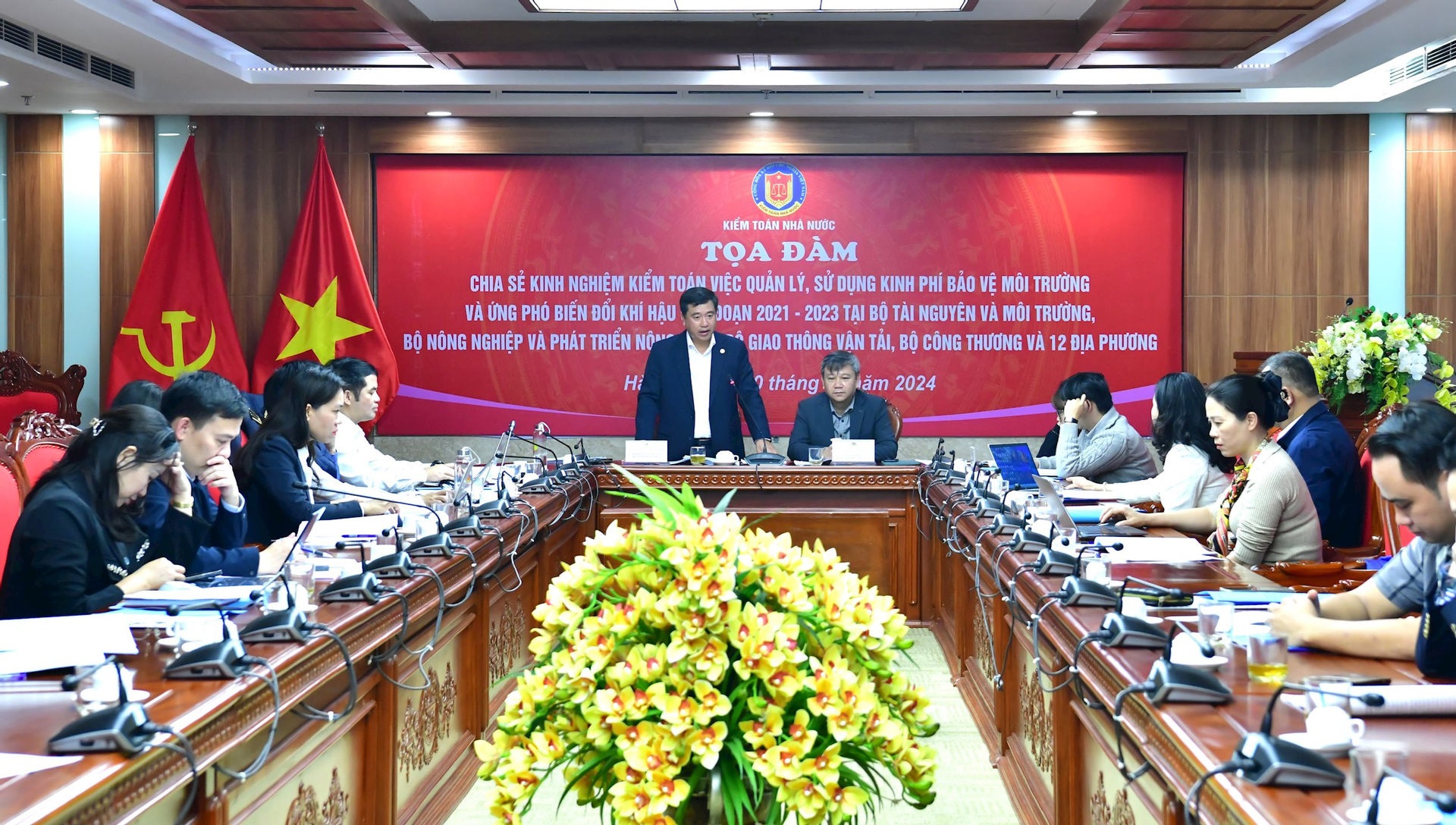(sav.gov.vn) – To improve the effectiveness of environmental protection (EP) and climate change adaptation (CCA), audit activities play a crucial role in evaluating the economy, efficiency, and effectiveness of public finances management and use. Through audits, it identifies legislative gaps and offers timely and suitable recommendations.

Persistent gaps in mechanisms, policies, and law enforcement
In recent years, the State Audit Office of Viet Nam (SAV) has focused on and conducted numerous thematic and performance audits in the environmental sector. From 2015 to 2023, SAV carried out 12 audits on environmental management and protection efforts in economic zones, industrial parks, thermal power plants, craft villages, medical waste management, imported scrap, and water resource management in the Mekong River basin. Additionally, over 30 audits, including financial and compliance audits, integrated environment-related contents.
In 2024, SAV implemented the Office-wide thematic audit on “Management and use of environmental protection and climate change response funds (2021–2023)” at the Ministry of Natural Resources and Environment (MONRE), the Ministry of Agriculture and Rural Development (MARD), the Ministry of Transport, the Ministry of Industry and Trade, and 12 provinces and cities. Audit results revealed that the ministries responsible, particularly MONRE, have not completed necessary legal frameworks and technical guidelines to implement the Environmental Protection Law; Insufficient collaboration between MONRE with other ministries resulted in delays in drafting and issuing regulations; Of the 37 new environmental tasks, 11 were not approved or allocated budgets during 2021–2023, affecting the development of essential guidelines and regulations by MARD, which require scientific research outputs as a foundation.
Through audits at localities, SAV has identified significant delays in issuing service prices of the collection, transportation, and treatment of solid household waste; Failure to fully utilize environmental protection fees from mineral exploitation for local environmental protection and investment; budget allocation through money orders to pay for contractors to implement the environmental protection services contracts was not in adherence to applicable regulations.
Many localities also lacked effective mechanisms to promote waste reduction, reuse, and recycling. The total volume of wastewater collected and treated in urban areas remains significantly low, while the proportion of untreated domestic wastewater discharged directly into the environment is notably high. Most rural residential areas lacked centralized wastewater collection and treatment systems. Moreover, issues were found in waste management, such as overloading of garbage trucks and inaccuracies in waste collection, sorting, transportation, disposal, and waste volume and transportation distance calculation.
The national legal framework for climate change adaptation lacks a comprehensive vision to 2030 and fails to align with current realities and regulations. Audits of investment projects funded by environmental and climate change response budgets uncovered numerous errors in the processes of preparing, evaluating, and approving investment policies and projects, construction design and estimation, contractor selection, contract signing and execution, as well as managing volumes, unit prices, construction quality, and project completion settlement.
Ms Nguyen Thi Nguyet Anh, an SAV auditor from the Specialised Audit Department No. III, noted that these shortcomings stem partially from the lack of clarity and timeliness in management mechanisms and policies, in addition to mismanagement by agencies using environment-related non-business funds. Based on audit findings, SAV recommended amendments to 16 legal documents, including seven laws and five regulations under the authority of the Prime Minister. Importantly, audit conclusions and recommendations have prompted state management agencies, localities, and units to change their perceptions and improve their approach to implementing environmental responsibilities.
Continuing to conduct environmental audits in the Office-wide
Deputy Director General Nguyen Thanh Ha emphasized that environmental and climate change issues are inherently complex, interdisciplinary, and affect various vulnerable groups and the nation's sustainable development. As a result, SAV will continue thematic Office-wide audits in additional localities. However, due to the complexity of environmental issues, audit delegations face numerous challenges throughout the auditing process, from planning to execution and reporting.
Nguyet Anh highlighted that SAV must fulfill commitments with INTOSAI (the International Organization of Supreme Audit Institutions) regarding evaluation of government response to adapt to climate change. However, governmental actions are still at the initial stages of developing programs, plans, and proposals, which are continuously adjusted to suit national and international contexts. Therefore, selecting audit topics requires careful research and consideration.
During a workshop on auditing environmental protection and climate change response budgets for 2021–2023, audit delegations suggested that SAV should conduct more audits of environmental, climate change and SDGs, concentrating on identifying policy and regulatory inadequacies to provide actionable recommendations; the audit topics should be specialized in specific areas to evaluate the economy, efficiency, and effectiveness of managing environmental protection funds; Consulting with specialists to refine audit methodologies and approaches is a vital need; leveraging Information Technologies to improve data collection and reduce audit time pressures, while establishing a database on environmental audits and related mechanisms for audit topic selection and audit criteria development as well as other future reference purposes.
Recent environmental audit outcomes have helped state management agencies, localities, and units shift perspectives, improve management practices, and better execute environmental protection and climate change adaptation initiatives. Furthermore, SAV has supported the discovery of resources and opportunities to foster sustainable development in Viet Nam, including funding for environmental protection and climate change resilience.